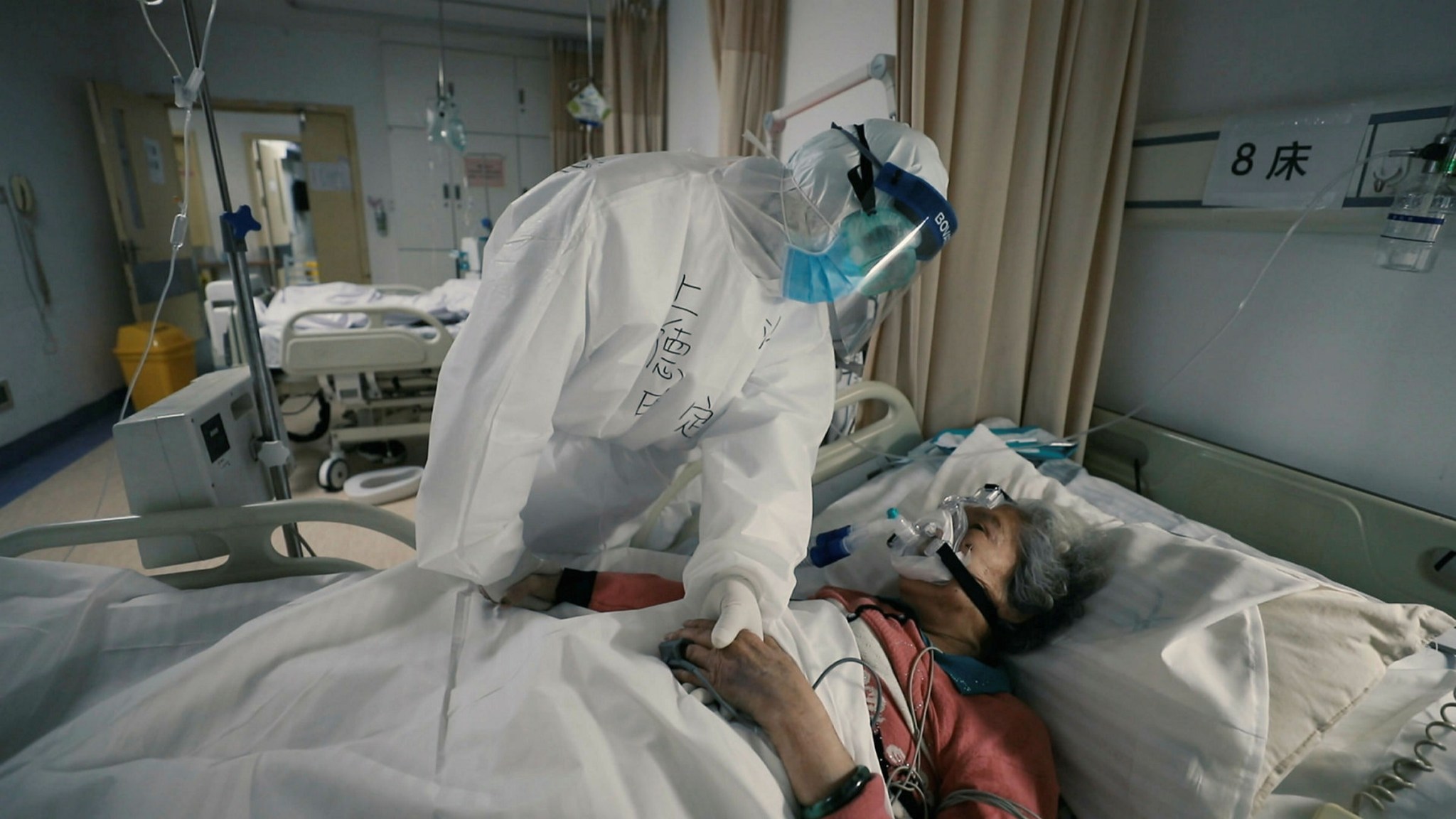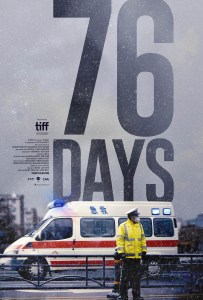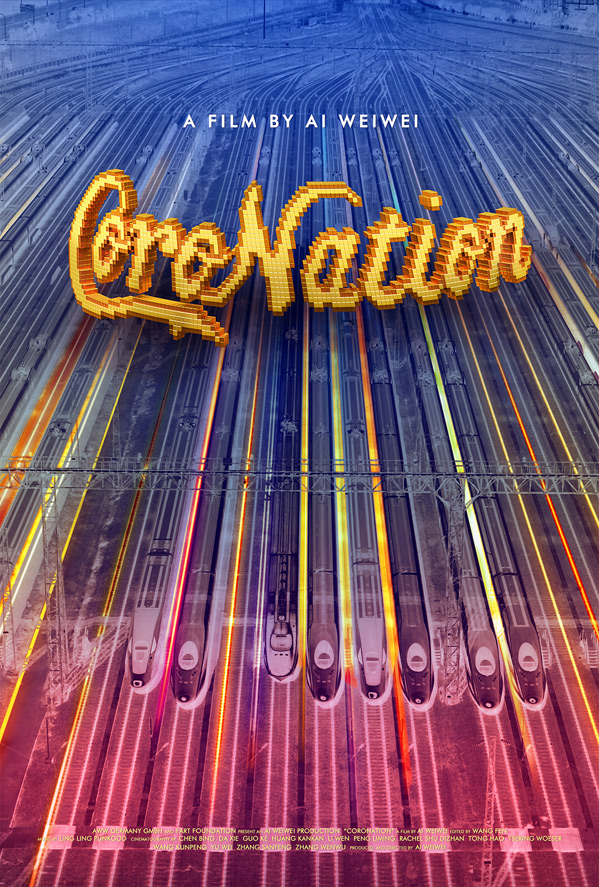Doc Corner: '76 Days' and 'CoroNation' go inside Wuhan
 Thursday, January 28, 2021 at 12:30PM
Thursday, January 28, 2021 at 12:30PM By Glenn Dunks

Alex Gibney isn’t the only one who can crush a deadline and produce a documentary about COVID-19 in time for the new year. While Gibney’s Totally Under Control, made alongside (but appropriately socially distanced, of course) Ophelia Harutyunyan and Suzanne Hillinger, came out in October in an attempt to radicalise the American voters with tales of the then Trump-led American government’s inept response to the coronavirus outbreak. In doing so it already looks out of date.
Two other features, however, hone in more precisely on the pandemic’s beginnings in the city of Wuhan of the Hubei Province in the heart of China. Hao Wu and Weixu Chen’s 76 Days (made in collaboration with ‘Anonymous’) and Ai Weiwei’s CoroNation take different tacts with this setting, showing a city in chaos and alarming stillness at once.
 The title of 76 Days refers to the length of Wuhan’s lockdown, as the city experienced the sort of apocalyptic medical crises that we would later see—and continue to see—across Europe and the United States. As an aside: The city of Melbourne, Australia, where I live, underwent our own similar lockdown of five million people, an even longer one in fact, but have since enjoyed 70-odd days with no community transmission and are slowly resuming life as ‘normal’. In August we had the same daily numbers as the UK. :/
The title of 76 Days refers to the length of Wuhan’s lockdown, as the city experienced the sort of apocalyptic medical crises that we would later see—and continue to see—across Europe and the United States. As an aside: The city of Melbourne, Australia, where I live, underwent our own similar lockdown of five million people, an even longer one in fact, but have since enjoyed 70-odd days with no community transmission and are slowly resuming life as ‘normal’. In August we had the same daily numbers as the UK. :/
But back to the movies.
Unlike Ai Weiwei’s film, 76 Days takes on the form of a video diary from the halls of Wuhan hospitals as they battle not just the outbreak, but the physical and emotional impacts on patients and doctors. There is little editorialising, but a lot of the daily grind as doctors and nurses attempt to prevent outright catastrophe.
Much of the footage is covert, presumably (hence the 'Anonymous' director credit), filmed on mobile phones and ignores any desire to fill its runtime with the sort of brain-numbing statistics and expert opinions (it’s only 90 minutes). The film that has been assembled by editor and co-director Hao Wu is often captivating, finding the inherent drama in the situation as it unfolds with its many bruising, heartbreaking lows and infrequent highs that occasionally peek through. It opens with death and it is a familiar sight throughout, the randomness and the ugliness of it never vanishing despite its prevalence.
We witness the daunting, haunting images of waiting rooms full of people who one must assume will not all survive. In probably the film’s most emotional through-line (most of the doctors are completely covered head to toe in PPE so discerning character isn’t easy) is an old man with dementia who, quite understandably, wants to leave and is prone to staggering down the hospital halls. In another scene, a hospital worker is seen using the mobile phones of deceased patients to locate their relatives in order to tell them their family member is dead and, of course, how they can collect their belongings. It's a staggering scene of observation.
76 Days presents this all as very matter-of-fact and as removed from sentimentality or politics as possible. But while I am sure nobody in the audience for a documentary like this is ever likely to call conspiracy theory shenanigans on what it presents, it’s unvarnished glimpse into what it is like in the earliest days of a global pandemic are often raw and painful, and eye-opening to the toll it takes on everybody.
 Ai Weiwei, on the other hand, certainly can’t avoid politics even if he tried. And although the notorious Chinese artist and political agitator doesn’t appear on screen throughout CoroNation (he was in Europe), his reputation lingers over it. While his cameras, operated by a suite of cinematographers, do enter hospitals, Ai and editor Fen Wang are often more interested in the world around the hospitals and the people within them. He opens with a Wuhan resident attempting to get back home through a snowstorm while his papers are inspected by police and his temperature tested by a gas station attendant. A typical sight in those early days. The camerapeople are asked several times to not film. Whoever is doing the interviewing in certain sequences seems intent on riling up the residents to get them to (quite justifiably) criticise the Chinese government for their handling of the disease’s initial outbreak. Not that its that hard when the stories are often traumatic and upsetting; people not just left to die, but done so after being (deliberately?) misled about the virus’s transmutability.
Ai Weiwei, on the other hand, certainly can’t avoid politics even if he tried. And although the notorious Chinese artist and political agitator doesn’t appear on screen throughout CoroNation (he was in Europe), his reputation lingers over it. While his cameras, operated by a suite of cinematographers, do enter hospitals, Ai and editor Fen Wang are often more interested in the world around the hospitals and the people within them. He opens with a Wuhan resident attempting to get back home through a snowstorm while his papers are inspected by police and his temperature tested by a gas station attendant. A typical sight in those early days. The camerapeople are asked several times to not film. Whoever is doing the interviewing in certain sequences seems intent on riling up the residents to get them to (quite justifiably) criticise the Chinese government for their handling of the disease’s initial outbreak. Not that its that hard when the stories are often traumatic and upsetting; people not just left to die, but done so after being (deliberately?) misled about the virus’s transmutability.
Ai is an artist though, even if his films can sometimes fall too hard on his legacy (Cockroach, another 2020 film from him, is highly recommended), and so his film captures art amid the quiet chaos. Most notably during the eerily silent yet elegantly composed aerial shots of Wuhan or, more down to earth, a team of disinfectors spraying the city including some on segways. Those devices as well as the litany of phones and computer screens are some of the most grounding images in a film, which gets much of its impact from moments that feel cut out of time, like a man eating rice in an apartment with no electricity or a grocery delivery rider wheeling his cart around the city. In CoroNation’s most extended sequence, one woman defends her history with the Communist Party before giving a fine analogy of how the disease spreads using the example of ants who return to the nest with poison. Biotoxin transmission she calls it.
While Ai’s use of unexpected electronic music selections is appreciated, there are times when its two-hour length is felt. Maybe a little extra production time would have allowed him to refine it. Still, it’s a significantly powerful viewing experience in the midst of the world’s continued COVID affliction. It shares scenes between 76 Days; it’d be hard not to. Most potent are its closing moments when Wuhan residents arrive to collect the ashes of their dead relatives as if they were dry cleaning. Some wail, others are stoic in their silent grief. Its final title card notes that, “The first case of COVID-19 appeared in Wuhan on December 1, 2019. For several weeks officials concealed information about the virus human-to-human transmission and its infection and mortality rates.” I look forward to a sequel that has the time and the ability to really dig into that.
Release: 76 Days is out now in virtual cinemas through MTV Documentaries. CoroNation is available to rent through Ai Weiwei's website or on Kanopy.
Oscar chances: I don't think CoroNation will be eligible due to only receiving a digital premiere (as far as I am aware), but 76 Days is the one more likely to get attention anyway. It's buzzy and I would guess that it has a much better shot than Totally Under Control.
 Ai Weiwei,
Ai Weiwei,  COVID19,
COVID19,  Doc Corner,
Doc Corner,  Review,
Review,  documentaries
documentaries 


Reader Comments